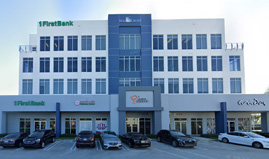Patient Information
Patient Surgical Instructions
When it comes to your surgery, safety is our #1 concern. Always follow the advice of our professionals.
Sickness Prior to Surgery
If you become sick prior to your surgery (stomach bug, upper respiratory infection, sore throat etc.), please call the office. You will likely need to go to your primary care provider to have the illness checked. If you have an infection, we do not want to chance having it travel to the surgical site. Also, the anesthesiologists want your lungs to be clear, (no matter what type of anesthesia you are having — local, regional or general).
Cancellations
If you need to cancel your surgery due to illness, emergency or other reasons, please notify the office for any cancellations at least 72 hours prior to your surgical date. This allows us to adjust the schedules of our other patients. Last minute cancellations impose undue hardships on other patients. Cancellations should be either called in or sent to [javascript protected email address]
What Medications to Stop Prior To Surgery
Do not take traditional over-the-counter or prescription anti-inflammatory medications 7 days prior to surgery:
- ASPIRIN
- IBUPROPHEN
- MOTRIN
- ADVIL
- ALEVE
- MOBIC
- RELAFEN
- NAPROSYN
- CELEBREX
- HERBAL SUPPLEMENTS*
*Many supplements (vitamins/herbs) can react with other medications, prolong clotting time, and increase the effect of anesthesia. To be safe, avoid taking supplements 1 week before surgery unless otherwise directed by your medical doctor or the surgeon with whom you are scheduled for surgery.
If you are taking Mobic or Celebrex, relafen, indocin, or any other anti-inflammatory, it is recommended that you stop taking this medication SEVEN days before surgery. These products can affect the way your blood clots and could cause more bleeding in and after surgery.
If you are on Coumadin (Warfarin), Plavix (clopidogrel bisulfate), Lovanox (enoxaparin), Aspirin or Ecotrin therapy as prescribed by your primary care provider, speak to your doctor directly regarding what to do as far as dosing of your medication before surgery.
You MAY take Tylenol up to the day before surgery as needed for pain.
Night Prior To Surgery
Food and Drink
Do not eat or drink anything after midnight. You may take certain medications the morning of surgery with a sip of water. Check with your doctor.
Grooming
Remove all finger and toenail polish prior to surgery so that the circulation in your extremities can be monitored. Report any new cuts to the nurse or physician assistant prior to surgery to avoid cancellation on the day of surgery. You may be asked to wash the surgical site with a special cleansing soap the night prior to surgery. This soap shall be provided for you.
Surgical Site Marking
Do NOT mark the surgical site yourself prior to surgery. I will formally mark the site of surgery immediately prior to the surgery. Also, do not mark the other side (i.e., non-surgical shoulder) as this may generate confusion.
What to Bring to Surgery
Brace, sling, crutches
You may have been given a special sling, brace, boot, or assistive walking device such as crutches or walker prior to surgery. Please be sure to bring this with you on the day of surgery.
Pain medications
If you were given a prescription prior to surgery for pain medications, please have this filled prior to surgery and bring the medications with you the day of surgery.
Ride Home
Please arrange for a ride home from the hospital. Patients undergoing anesthesia should not drive themselves home after surgery. Also, do NOT make important decisions in the 48 hours after surgery.
After Surgery Visit
You will come into the office anywhere between 3 and 15 days AFTER surgery to have your dressing changed. This visit may be set up prior to your surgery, or we may ask that you schedule it after your surgery date by calling the office. Unless we ask you to remove your own dressing, it should be left in place until you are seen in the office. Please call 305.520.5625 to schedule an appointment.
Physical Therapy Appointment after Surgery
Most surgeries will require immediate therapy in the post-surgical setting.
Please arrange PRIOR to surgery a location for your intended therapy. Specific therapy instructions specially catered to you and your procedure will be provided for your therapist in the post-surgical setting. Delays in setting up therapy in the post-surgical setting may result in less than ideal results.
Getting a full range of motion, strength and flexibility back after surgery usually takes time. That’s where pre-operative exercise and education and post-operative physical therapy programs come in – to ensure you’re physically and emotionally prepared for surgery and to maximize your recovery after surgery.
Pre-operative Medical Tests and Clearance
Medical clearance
You may be required to undergo a medical clearance prior to surgery if you are over the age of 40 and/or if you have certain medical problems. This is usually performed at your medical doctor’s office. If you do not have a medical doctor, my office can recommend a physician. Special clearances may be required from other physicians such as a pulmonologist, cardiologist, etc. prior to surgery.
Your doctor(s) MUST forward the medical clearance to our surgery scheduler.
Blood and Urine Tests
You may need to have blood and urine tests before surgery. If you are over the age of 40, you may need to receive medical clearance from your primary care physician. The surgery scheduler and/or nurse and physician assistant will coordinate with you the tests (i.e. blood tests, an EKG, and a chest X-ray) which you may need. Your doctor MUST forward the test results directly to our surgery scheduler.
Chest X-ray and EKG
You may need to have a chest x-ray and/or an EKG performed prior to surgery. The surgery scheduler and/or nurse and physician assistant will coordinate with you the tests which you may need. Your doctor MUST forward the test results directly to our surgery scheduler.
Surgery Appointment
The time of your surgery will be given to you by either the hospital or surgery center. It is not uncommon that you will be asked to arrive a couple of hours in advance. If you have not heard from the hospital by 4:00 p.m. the day before surgery telling you what time to arrive for your surgery, call the hospital or surgery center and ask to speak with a pre-op nurse. Contact websites are:
Baptist Hospital
Tel:
Mercy Hospital
Tel:
Miami Surgical Center
Tel:
- The MOST important thing to remember is: DO NOT EAT OR DRINK ANYTHING ON THE DAY OF THE SURGERY. Specifically, do not eat or drink after midnight the night before the surgery. THIS MEANS NOT EVEN COFFEE OR WATER, etc. You may brush your teeth; just DO NOT SWALLOW ANY WATER. If you do eat or drink, your surgery will be cancelled by the anesthesiologist. There will be no exceptions to this rule
- If you take medication on a regular basis, ask you primary medical doctor whether or not it is advised for you to take it on the day of your surgery. If you do, take it with only enough water to comfortably swallow the medication.
- If you typically wear contacts, wear glasses on the day of the surgery.
- Do not bring valuables, including jewelry, and large amounts of money with you to the hospital. If you are spending the night, you may want to bring a small amount of money to activate the television service or use the gift shop.
- Wear comfortable clothing including sweat pants or loose-fitting pants if you are having knee surgery or a button-down shirt or sweat shirt that is extra-large which will easily fit over your bulky dressing if you are having shoulder surgery. If you will be spending the night in the hospital, remember to bring toiletries as well as shorts and comfortable sturdy shoes or running shoes to walk in if you are having knee surgery.
- At the hospital on the day of surgery, you will be prepared for surgery in the pre-op area. It is during this time that you will meet with the anesthesiologist. He/she will discuss with you the options of anesthesia and help you decide which type will be best for you.
- After surgery, you will be taken to the recovery area. You will be in this area for approximately 1-2 hours as your anesthesia and vital signs are monitored. Family members are not permitted in the recovery room.
- If you are not spending the night in the hospital, you will be discharged from the recovery room. YOU MUST HAVE SOMEONE PICK YOU UP AND TAKE YOU HOME FROM THE HOSPITAL. This is a state law.
- You will receive postoperative instructions after your surgery. In general, if your fingers are free, we advise that you move them each hour to prevent stiffness during the postoperative period. If you had shoulder or knee surgery, please make sure you adhere to your instructions as to whether you should remove the sling or brace to start motion before your first appointment or whether you are not allowed any early motion.
 Knee Arthroscopy Post-Surgical Instructions
Knee Arthroscopy Post-Surgical Instructions Hip Arthroscopy Post-Surgical Instructions
Hip Arthroscopy Post-Surgical Instructions Shoulder Arthroscopy Post-Surgical Instructions
Shoulder Arthroscopy Post-Surgical Instructions
Please know that these are general guidelines. There are exceptions that obviously depend on individualized care, injuries and recuperation. Your therapy program will be personalized for you along with your follow-up appointments. If this does not meet up to your satisfaction, please express your thoughts at the time of surgical booking because we need to understand your expectation as well as explain our guidelines. We want to manage and understand all your expectations.
It is important for you to know that the four to six-week time period after surgery is a crucial time in orthopedics because it is when key adjustments in the therapy program occur. If there are any adjustments that are needed, we will modify your post-operative care plan as necessary to ensure that we get your recovery on target to deliver the best healthcare for you.
It is very important to let you know that at most visits you will see Dr. Hommen. However, occasionally — for example for dressing changes or routine follow-ups, you may see his Physician Assistant or Extender.
Most of the time we will schedule your first post-operative appointment when you schedule surgery. You will schedule the remaining appointments with the office staff each time you leave the office.
Post-operative Medications
Medication
There are two types of medications you may be prescribed – Non-Steroidal Anti-Inflamatory (NSAIDs) and Pain Killers. The Pain Killer is by prescription only and will typically be one of the following: Percocet, Oxycodone, Oxycontin, Vicodin, Darvocet, Tylenol #3. You will be discharged with instructions to take pain medications. The NSAID is available over-the-counter. However, in certain surgical cases, the use of NSAIDS is counter-productive and may delay healing and may therefore NOT be prescribed.
- Non-Steroidal Anti-Inflammatory (NSAID): IF YOU HAVE BEEN GIVEN THIS PRESCRIPTION, START TAKING THESE MEDICATIONS THE DAY YOU GET HOME FROM THE HOSPITAL. An anti-inflammatory is used to help reduce swelling and pain. You need to take your anti-inflammatory on a regular basis for a full 6- 12 week after surgery. These medication options include ADVIL and ALEVE and are available over the counter. For pain while taking the anti-inflammatory you can take Tylenol (acetaminophen). DO NOT TAKE ANTI-INFLAMMATORIES IF YOU HAVE AN ASPIRIN ALLERGY OR ANY ACTIVE STOMACH/ULCER PROBLEMS
- Pain Killer: ONLY TO BE TAKEN AS NEEDED FOR PAIN. YOU MAY START TAKING THE DAY YOU GET HOME FORM THE HOSPITAL. A narcotic is taken to help decrease pain after surgery. Discomfort can be expected after surgery and we want you to be able to keep on top of it. The pain medication is to be taken ONLY AS NEEDED. Even if you do not think you will need it, we do want you to fill the prescription so that you have it. Narcotics can cause drowsiness, so do not drink or drive while taking this medication. They may also cause nausea. If you go back to work soon after surgery you may want to take it in the evenings and use only the anti-inflammatory for pain during the day. Extra strength Tylenol is also a great pain killer and can be taken as a first resort with your anti-inflammatory to decrease the need for a narcotic. Taking a pain killer on a regular basis can cause constipation. To help keep you regular, use an over the counter fiber supplement such as Metamucil or Citrucel.
Medication Refills
If you notice you are getting low on a medication that you need and do not have any remaining refills, please plan ahead and notify us at least two days before your medication runs out. Certain narcotic medications may not be ordered or refillable via phone at the pharmacy according to Florida state law.
Post-operative Total Joint Replacement Information
- Prophylactic antibiotics after total joint replacement surgery. Please contact the office for further information.













